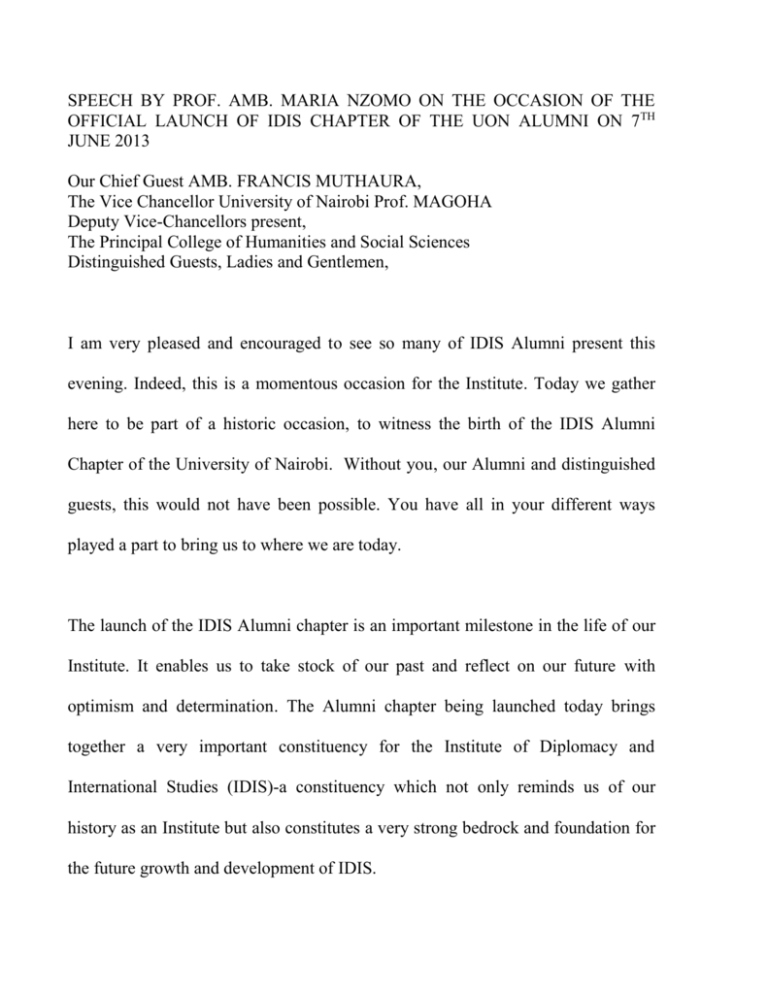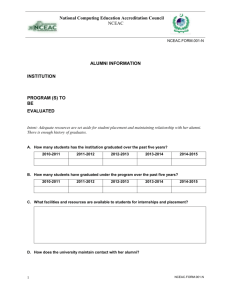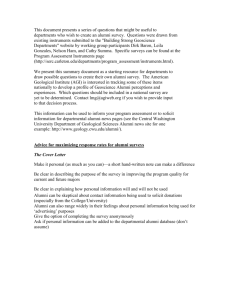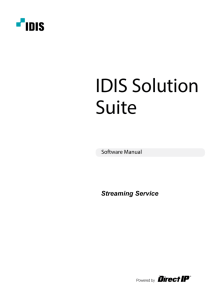PROF NZOMO ALUMNI SPEECH - Institute Of Diplomacy and
advertisement

SPEECH BY PROF. AMB. MARIA NZOMO ON THE OCCASION OF THE OFFICIAL LAUNCH OF IDIS CHAPTER OF THE UON ALUMNI ON 7TH JUNE 2013 Our Chief Guest AMB. FRANCIS MUTHAURA, The Vice Chancellor University of Nairobi Prof. MAGOHA Deputy Vice-Chancellors present, The Principal College of Humanities and Social Sciences Distinguished Guests, Ladies and Gentlemen, I am very pleased and encouraged to see so many of IDIS Alumni present this evening. Indeed, this is a momentous occasion for the Institute. Today we gather here to be part of a historic occasion, to witness the birth of the IDIS Alumni Chapter of the University of Nairobi. Without you, our Alumni and distinguished guests, this would not have been possible. You have all in your different ways played a part to bring us to where we are today. The launch of the IDIS Alumni chapter is an important milestone in the life of our Institute. It enables us to take stock of our past and reflect on our future with optimism and determination. The Alumni chapter being launched today brings together a very important constituency for the Institute of Diplomacy and International Studies (IDIS)-a constituency which not only reminds us of our history as an Institute but also constitutes a very strong bedrock and foundation for the future growth and development of IDIS. Chief Guest sir, The institute of Diplomacy and International Studies has come a long way. We started way back in 1973 as the Diplomacy Training Programme located in the then department of Government (now the Department of Political science & Public Administration) at the University of Nairobi. The strategic role that this programme played in training future diplomats for East and Central Africa region motivated key donors who supported the transformation of this diploma programme into a full fledged Institute. In this regard, I wish to recognize the Swiss government who provided substantial financial support for setting up the Institute. Funding was also obtained from UNDP, the Commonwealth Fund for Technical Cooperation, Ford Foundation and Sasakawa Foundation. The Institute was officially launched in 1990 to offer post graduate programmes in Diplomacy & International studies and was located in the College of Humanities and Social Sciences (CHSS). From its humble beginnings with only 18 diploma level students, the Institute which now has a student body of 1348, has grown to become the leading research and training Institute of its kind in Africa with a pan African and global outreach. IDIS has a broad base curriculum that attracts students not only from the various social sciences but also from other disciplinesincluding the military service, health services, and many in the business sector. Today the Institute awards Doctorate Degrees in International Studies, Masters Degrees in: International Studies, Diplomacy, International Conflict Management, and Strategic Studies. We also offer Post-graduate diplomas in International Relations and Strategic Studies as well as a very popular Bachelor of Arts Degree in International Studies and Diploma in International Studies. Over the years the Institute has maintained a leadership position in the training of diplomats and conflict managers who perform negotiation, mediation and other diplomatic functions in different parts of the world. Due to the strategic nature of the training programmes offered at IDIS as well as our Pan-African and multinational culture, the Institute has continued to attract students from different parts of Africa including Nigeria, Egypt, South Africa, Cameroon, Tanzania, Uganda, Zimbabwe, Rwanda, South Sudan, Burundi and Zambia just to mention a few. For example out of the 18 in the 1991/2 class only 5 were Kenyans. Within Kenya the IDIS Alumni are spread in all key institutions in our society I am sure many of the Alumni gathered here today are key players in government departments, the United Nations and other international organizations as well as the civil society. Just to mention a few, some of our high ranking Alumni, are the current top Service Commanders of the three branches of the Kenya Armed Forces –the Army, Navy and Air Force as well as the Commandants of both Defence Staff College and National Defence College, the Director of the Kenya National Intelligence Academy, the Army Commander of the Tanzania People’s Defence Forces, the General in charge of the military intelligence in Tanzania, the Chief of General Staff of Malawi, former Ugandan Army commander, the Police Commissioner of Rwanda and Minister of State for Defence of Uganda and Chief of General Staff of Malawi. These and many others are the result of IDIS collaboration with the National Defence College and the Defence Staff College where we offer one year post graduate diploma and degree programs in International Studies and Strategic studies respectively, to senior government officers drawn from the entire African Continent, who play very key roles in national and international security architecture. I am proud to note that some of the officers deployed in Somalia under ‘Operation Linda Nchi’ are actually our IDIS Alumni who are now apply the knowledge acquired at IDIS, to defend Kenya’s national interest in Somalia. Others are actively engaged with the South Sudan Peace Process, the Somali stabilization and reconstruction process and other similar engagements in different parts of Africa. Also among IDIS Alumni, are several of our Kenyan Ambassadors, including our Chief Guest, as well as some PSs, such as the outgoing PS for Internal security & many others deployed in International Organizations. Chief Guest Sir, The launch of the IDIS Alumni coincides with the African Unity Jubilee celebrated a week ago. As Africa celebrates and reflects on the last 30 years of PanAfricanism efforts, we too should reflect on the ‘Role of Diplomacy in Africa’s Leadership in the 21st Century globalizing world’. The challenge of our time is not only whether African can claim the 21st Century; but also whether Africa can play a leadership role in the 21st Century. In this regard, the Institute of Diplomacy and International Studies through its rich, skilled, experienced and diversified Alumni is already providing as a key catalyst towards meeting this challenge. The Institute will continue strengthening and diversifying our training programs to respond and manage the emerging issues of International Relations in the 21ST Century. We have diversified our training programmes to include area studies with special focus on the distinctive features of each region of the world. We have for example, diversified our programs in diplomacy beyond the traditional concerns of bilateralism and multilateralism to include public and health diplomacy. Chief guest Sir, In conclusion I wish to underscore that the impact of Alumni Associations in the development of university education the world over cannot be underestimated. Such associations play key roles in the development of key infrastructure and facilities that have made significant contributions to the growth of some of the world-famous universities and other educational institutions. They also provide a Forum for Alumni interaction with current staff and students. Within this context therefore, the importance of establishing an IDIS Alumni chapter as part of the main university of Nairobi Alumni Association will provide IDIS with a mechanism that enhances its visibility and image nationally and internationally-to become the regional & International “Institute of Choice”. It also provides a framework that allows the Institute to effectively reach out and tap into its huge potential and broad network of Alumni spread within the country, the African continent and the world. Distinguished guests, Ladies and Gentlemen I wish to thank you again for making time to join us at this historical occasion for the IDIS family







